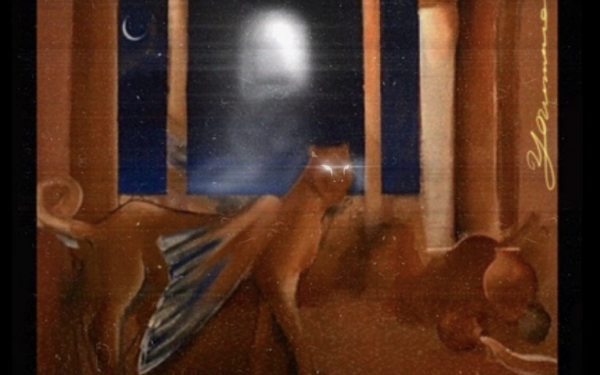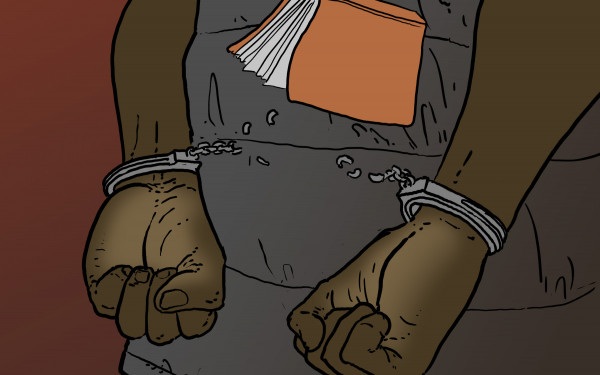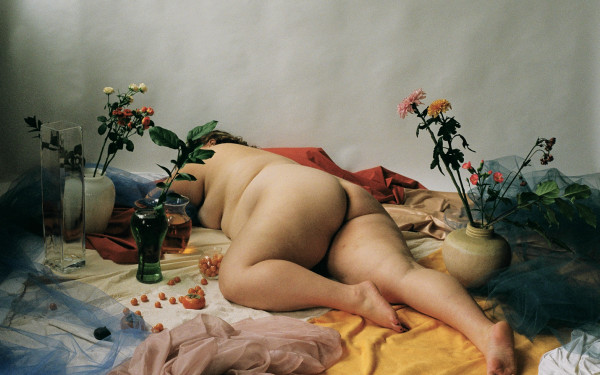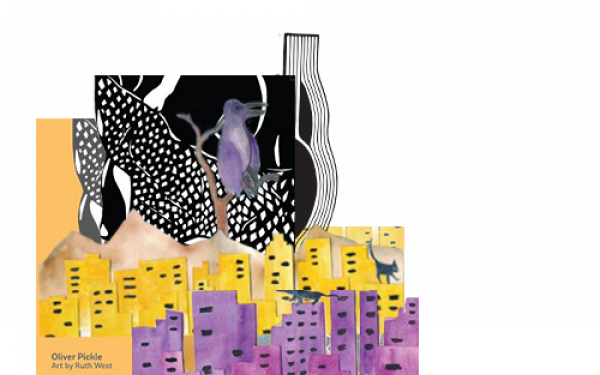Rihab Essayh is building worlds that are radically soft
The Evaporated Tears of Sand Roses conceives healing for SWANA community
On a balmy Friday afternoon in Montreal’s Plateau, Rihab Essayh is tucked into the nook of a cosy, artist-run centre with white walls and creaking floors.
The centre, Ada X, is hosting Essayh as its first artist-in-residence this autumn, and while it is her first day in the space, Essayh fits right in. She sits with pink highlights in her hair, a purple-and-white checkered skirt and a baggy green sweater that says, “I AM OKAY.”
“It feels weird to do an interview this early [in the residency],” she says, glancing up from her laptop. “It’s still the beginning; I’m addressing what I want to do, possibly an event or more research, or experimental installation.”
Essayh, 32, was born in Morocco and raised in Montreal. Her art—a blend of installation, poetry and performance—is not just something she creates; it’s something she inhabits. Her work is deeply intertwined with her experiences and the communities that have shaped her.
“I work a lot on how to honour my community; [how to] honour my support system,” Essayh says. “My past work was literally a whole love letter to them.”
Essayh’s residency, The Evaporated Tears of Sand Roses, is a poetic exploration of grief and transformation, reflecting the shared experiences of the Southwest Asian and North African (SWANA) diaspora. The sand roses symbolize beauty born from desolation.
“It echoes how the stone, the sand rose, present in North Africa and the desert [...] is produced by this process of evaporation. It's the salt that can glue the minerals together,” Essayh says. “But it also echoes this aspect and process of grief among the SWANA community, a grief that we're all feeling right now in regards to [...] the genocide of Gaza. This is colonization at its peak, and also dehumanization.”

Essayh’s art has always centred themes of utopia, softness, femininity and care, even during her time at Concordia as an undergraduate a decade ago. Her work for The Evaporated Tears of Sand Roses started back in September 2023, but she has begun to question why she is even creating a utopia when her community is suffering so much.
“How do I even comprehend, or grasp, or be able to imagine this soft future when the present is so bleak?” she asks. “It feels obsolete at times, wanting to make something utopic, especially in such a bleak reality.”
The Link asked Essayh how she plans to reconcile radical softness with the grief surrounding her SWANA community.
“I don’t know,” she says. “That’s the purpose, I think, of the residency. I'm realizing that I love talking about community. I think I'm just shifting toward [...] making events for a specific community, because it needs to be for them, because it needs to be safe for them.”
For Essayh, making space for healing doesn’t negate the painful realities surrounding the SWANA community, but rather offers a necessary refuge.
“It's just understanding that you're in a room with people [who], without saying a word, understand you,” she says. “That feeling of communal acknowledgement is quite powerful.”
Essayh explains that something like the sounds from Montreal’s annual international fireworks competition this summer, L'International des Feux Loto-Québec, may be traumatic to those who have survived war or genocide. Here, the importance of gentle, therapeutic spaces becomes clear.
“I need it, so I need to make it,” Essayh says. “I need to have these spaces for me.”
Somewhere between being seen and being embraced, in a place that is less cynical, less defensive, more nurturing and radically soft, Essayh envisions her art.
“I consider myself a very feminine person,” she says. “I view the world through that lens. [...] Showing a neutral view of the world is not neutral. I am not neutral. I'm full of this one field of experience.”

The Link spoke with Tyra Maria Trono, a Filipinx artist, cultural worker and curator. She is also the programming coordinator at Ada X, and is researching how cultural identification shapes a person's perception. Trono’s own work, like Essayh’s, explores how belonging to a diasporic community influences and redirects this process.
“[Essayh’s] work [centres] the themes of what's going on in the world, especially Palestine,” Trono says. “I felt like her work was driven.”
Trono’s colleague Chloë p.f. Lalonde is a multidisciplinary artist and cultural worker from Montreal, as well as the communications and social media coordinator at Ada X. Lalonde is interested in the experiences of inclusion and exclusion that emerge through art.
“I think [Essayh’s] work is something that is really needed and resonates a lot with the community right now,” Lalonde says. “I think it's a really needed place of sharing and coming together in the softness to process this grief.”
With her work, Essayh hopes to drive one thing home.
“There is one thing that is really important to me,” she says. “My work is in response to the genocide that is happening in Gaza. It's [...] very close to my heart and very jarring to see someone, people that look like me, being valued so little on a daily basis. Every work that I've made this year shifted because of that.”
Essayh toes the lines between an effervescent sense of hope, the heart-breaking nature of grief and a self-proclaimed caution “to not over-romanticize [her] lived experiences.” During her residency at Ada X, she will use the physical spaces and equipment to craft poetry that will serve as a song soundscape for The Evaporated Tears of Sand Roses, which will be exhibited at the Visual Arts Center of Clarington in Bowmanville, Ontario in February 2025.
“We cannot lose hope,” Essayh says. “We're not allowed to.”
This article originally appeared in Volume 45, Issue 2, published September 17, 2024.







